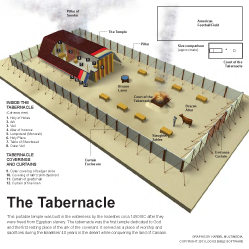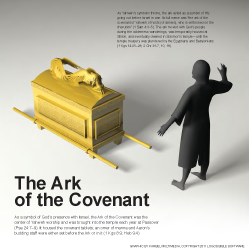3:1–21 After He pronounces destruction on the house of Eli, God calls Samuel as a prophet. |
3:1 Samuel was serving Yahweh The narrative always portrays Samuel as ministering in some capacity.
The word of Yahweh was rare During the period of the judges, the nation is characterized by flagrant sin. The lack of communication from God indicates His displeasure.
visions were not widespread In this chapter, the word of Yahweh is actually an appearance of Yahweh (v. 10). This visual encounter of Yahweh Himself is an important backdrop for the nt teaching of John that Jesus was the Word (John 1:1–14).
3:2 place (now his eyes had begun to grow weak Eli’s physical malady reflects his spiritual dullness and lack of perception. In 1 Sam 1:13–14, he mistook Hannah’s posture of prayer as drunkenness, and in 2:22–26 he weakly rebuked his sons.
3:3 the lamp of God had not yet gone out Indicating that it was nearly dawn (see Exod 27:20–21). The narrative might be subtly referring to Samuel as well: Despite the darkness that characterized Shiloh at this time, a glimmer of hope is found in Samuel.
the temple of Yahweh The Hebrew term used here, hekhal, refers to the tabernacle. It also might indicate the large main room of the tabernacle, separated by a veil from the holy of holies (most holy place). The setting highlights Samuel’s proximity to God: In this moment, he is the closest Israelite to Yahweh.
It also might indicate the large main room of the tabernacle, separated by a veil from the holy of holies (most holy place). The setting highlights Samuel’s proximity to God: In this moment, he is the closest Israelite to Yahweh.
the ark of God Refers to the ark of the covenant, a chest that represented God’s presence among His people (Exod 25:10–22; see note on Exod 25:10).
a chest that represented God’s presence among His people (Exod 25:10–22; see note on Exod 25:10).
3:4 Here I Echoes the obedient responses of the patriarchs and Moses (Gen 22:1, 11; 31:11; 46:2; Exod 3:4; compare Isa 6:8).
3:5 he ran to Eli Indicates that Samuel was readily available to serve and quick to obey.
3:7 Samuel did not yet know Yahweh This verse explains how Samuel could initially fail to recognize Yahweh’s voice: He was not yet a prophet. Although Samuel knew of Yahweh and served Him daily, he had not yet been called to his prophetic office.
 Prophetic Commissioning and the Divine Presence
Prophetic Commissioning and the Divine Presence
3:8 Eli realized that Yahweh was calling The only time Eli is perceptive; it takes three times for him to discern God’s call.
3:10 Yahweh came and stood Language about God standing is sometimes used to describe the closeness of His presence (Gen 28:13; Exod 34:5).
Samuel! Samuel Echoes God’s calls to Abraham and Moses (Gen 22:11; Exod 3:4).
Speak, because your servant is listening Samuel’s response varies slightly from Eli’s instructions (1 Sam 3:9), omitting the divine name.
3:11 the two ears of everyone who hears An expression describing the reception of terrible news (compare 2 Kgs 21:12; Jer 19:3).
3:12 all that I have spoken against his household See 1 Sam 2:30–36.
3:13 he did not rebuke them Eli’s rebuke in 2:22–25 was only halfhearted. Though he had the authority and responsibility to act against them, he did not (see note on 2:25).
3:14 the iniquity of the house of Eli would not be atoned for Eli and his sons had committed high-handed, flagrant sin (2:12–17, 31; compare Num 15:30–31).
3:17 May God punish you severely A characteristic oath formula that calls for divine action against a person for failing or refusing to obey (see Ruth 1:17; 1 Sam 14:44; 20:13; 25:22; 2 Sam 3:9, 35; 19:13). Samuel is forced to speak due to the oath.
3:18 he will do what is good in his sight Eli acquiesces and accepts God’s punishment.
3:19 He did not allow any of his prophecies to go unfulfilled This expression conveys the hallmark of a true prophet: His prophecies come to pass (see Deut 18:21–22).
His prophecies come to pass (see Deut 18:21–22).
3:20 Dan to Beersheba An expression that indicates all of Israel, from its northernmost city to its southernmost city.
3:21 Yahweh appeared again in Shiloh Reinforces that this encounter was visual, not merely auditory.

|
About Faithlife Study BibleFaithlife Study Bible (FSB) is your guide to the ancient world of the Old and New Testaments, with study notes and articles that draw from a wide range of academic research. FSB helps you learn how to think about interpretation methods and issues so that you can gain a deeper understanding of the text. |
| Copyright |
Copyright 2012 Logos Bible Software. |
| Support Info | fsb |
 Loading…
Loading…



